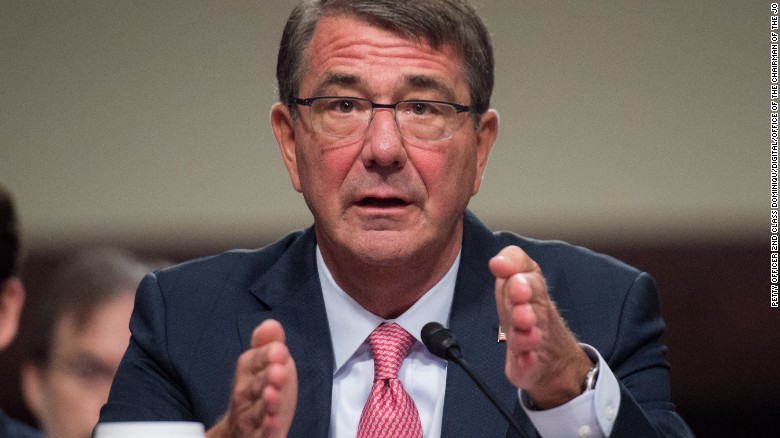Defense Secretary: Forces ready in 'weeks' for battle to retake ISIS capital
Defense Secretary Ash Carter said Wednesday it will be only a matter of weeks before the US and its allies are ready to drive ISIS from Raqqa, its symbolic capital in Syria.
The preparations come amid fears the terror group is plotting an attack somewhere around the world from inside the city.
Carter told reporters at a NATO meeting in Brussels that getting troops in place for the siege of Raqqa would be undertaken within weeks but declined to offer more specifics.
The plan "has us generating those forces in a matter of weeks ... generating them and positioning them for the isolation of Raqqa," Carter said.
"That's what I'm going to say," he said, adding, "And not many weeks."
It has been "long planned" that the US-backed assault on Mosul -- which started earlier this month -- Iraq and Raqqa would be overlapping, Carter said.
The top US commander in Iraq, Gen. Stephen Townsend, told reporters via satellite that it is "imperative to get isolation in place around Raqqa" because intelligence reports show there is "significant external operations attacks planning" taking place inside the city.
"We actually aren't sure how pressing it is, and that's what's worrying," Townsend said, noting he was limited by what he could say in a public forum. "We know they are up to something, and it's an external plot. We don't know exactly where; we don't know exactly when."
Carter said the military has "the resources we need" to undertake the operations in both Mosul and Raqqa at the same time.
"We're going to win this, and so if there's anything we need to do to accelerate, I'm prepared to ask for it," he said.
Carter addressed the issue in between meetings with his NATO counterparts, where the anti-ISIS mission is expected to be a major focus.
The transatlantic alliance is planning to boost its participation in that effort, committing to new aerial surveillance flights and a ramped-up presence in the Black Sea region, on the doorstep of its adversary, Russia.
Aside from training Iraqi military officers in Jordan, NATO had largely avoided direct involvement in the anti-ISIS fight, leaving it to individual member states -- all of whom are involved in the US-led coalition -- to make their own commitments.
The alliance hopes the new surveillance flights "will improve the coalition's overall air picture by providing surveillance and situational awareness, thereby making the skies safer," acting NATO spokesman Dylan White said Tuesday. "This is a meaningful contribution to the (anti-ISIS) effort and a clear signal of NATO's determination to help fight terrorism."
That determination, officials emphasized, is a longstanding one, despite recent criticism of NATO by Republican presidential nominee Donald Trump.
Speaking to reporters on Tuesday, NATO Secretary General Jens Stoltenberg pushed back on suggestions the US presidential campaign was driving the changes, as Trump has claimed.
"NATO has played a key role, has been in a front line in a fight against terrorism for many, many years with our operation in Afghanistan, training Iraqi officers supporting Tunisia, Jordan and many other ways," said Stoltenberg. "As I stated many times, the adaptation of NATO -- where you focus more on intelligence, where you step up of our efforts to fight terrorism, where we increase defense spending -- is not related to (the) US election campaign."
Deterring potential Russian aggression in Eastern Europe is also high on the agenda at this week's NATO gathering.
In his remarks to reporters, Carter announced the US will be contributing a persistent rotational combat armored brigade to Europe early next year to strengthen deterrence in the region.
News Courtesy: www.cnn.com











